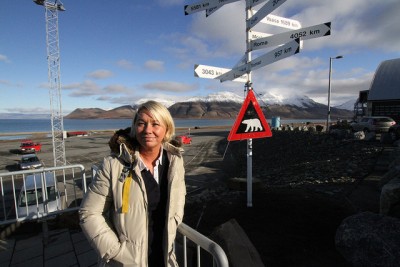The Norwegian government has decided to go along with controversial pleas to bail out the state-owned company that runs coal mines on Svalbard. Several other major parties in Parliament also support the climate-unfriendly coal mining operations, not least following Russia’s heightened activity in the Arctic.

The coal mining on Svalbard is highly contested, with the UN and environmental organizations urging its phase-out to reduce and eventually eliminate its hazardous carbon emissions. They’ve also pointed out the hypocrisy of parties like Labour that are calling on Norway’s oil fund to dump its coal investments, while at the same time turning over NOK 500 million in state funding to bail out Norway’s own coal extraction in the sensitive Arctic.
“This is nothing short of having a double standard,” Lars Haltbrekken of Naturvernforbundet (Friends of the Earth Norway) told state broadcaster NRK on Friday. Truls Gulowsen of Greenpeace Norge argued that “real policies” regarding coal mining and other sources of jobs on Svalbard shouldn’t be postponed “until the next crisis,” while Heikki Holmås of the Socialist Left party (SV) also claimed the government was “offering hay to a dead horse.” He was among those urging the government to use the half-billion kroner (equal to around USD 62 million) on other projects to create new employment possibilities on the Arctic archipelago that Norway wants to keep populated.
The financial crisis at mining firm Store Norske Spitsbergen Kulkompani was exacerbated by the sharp decline in coal prices, prompting the layoffs late last year of 95 workers. The coal mining has faced economic challenges for years, though, and, more recently, posed an embarrassing climate paradox for Norwegian governments that urge other nations to shut down their coal operations and claim to be trying to cut Norway’s carbon emissions at home.
Largest source of employment
The mines, however, are Svalbard’s single largest source of employment and local officials have argued that tourism and research operations on the Arctic islands can’t offset the loss of jobs that would occur if Store Norske was allowed to go out of business. The state’s new bailout agreement with Store Norske involves both a loan and purchase of company real estate, giving the state more direct ownership over property on the island of Spitsbergen.
Monica Mæland, the government minister from the Conservative Party responsible for business and trade issues, said at a press conference Wednesday night that the bailout was important for those who work for Store Norske and for the local community on Svalbard. At the same time, Mæland told NRK that it was also important for the state “to secure important real estate on Svalbard.” She insisted it only allowed ongoing operations in the short term and was “no guarantee for the future of the coal operation.”
She stressed that state officials were also already working on yet another study of other longer-term prospects for Svalbard that could create jobs and help maintain Norwegian population on the remote archipelago that’s under Norwegian jurisdiction. That’s perhaps of primary importance now, given rising tensions between Norway and Russia following the latter’s intervention in Ukraine last year.
Maintaining a foothold
Both Russia and Norway have been building up military presence in the Arctic, on the mainland and at sea, and Svalbard is an important foothold. Russia, as a signatory to the international treaty giving Norway sovereignty over the archipelago, has so far respected Norway’s jurisdiction. An incident last weekend, however, in which a top Russian politician defied Norway’s sanctions against him by landing on Svalbard, set off a fuss, with Russian officials calling Norway’s objections and demand for an explanation an “overreaction.”
Svalbard officials were predictably relieved over the coal mining bailout, claiming it would give them more “breathing space” to explore alternatives to coal. Critics were skeptical, fearing it will merely delay concrete projects to adjust Svalbard’s local economy. Speculation continue to swirl, meanwhile, over Russia’s own intentions on Svalbard, where it also runs coal mining and some tourism-related operation at Barentsburg. Russia also has plans to expand its own Arctic research station on Svalbard but all such projects would demand large budget allocations at a time when Russia’s economy is hit by low oil prices and western sanctions.
Norwegian researchers Jørgen Holten Jørgensen and Arild Moe, both of Fridtjof Nansen’s Institute outside Oslo, wrote in Friday’s Aftenposten that Russia’s coal mines at Barentsburg are also running empty. It would also require huge amounts of funding to open more.
In a commentary headlined “What do the Russians want on Svalbard?” they also noted, though, that Russia has objected in the past to Norway exercising its jurisdiction in the seas around Svalbard. They questioned whether Russia will challenge the peace in the Arctic by opposing Norwegian jurisdiction. That, they said, would pose a much bigger challenge for Norway than the unwanted stopover of the Russian deputy prime minister last weekend. Meanwhile, Norway intends to maintain its physical presence on Svalbard, and its authority.
newsinenglish.no/Nina Berglund

